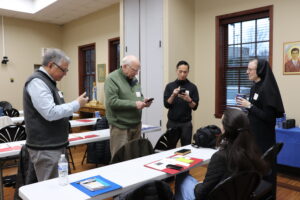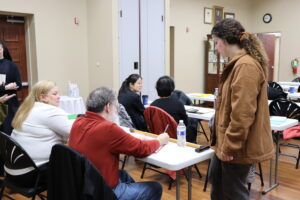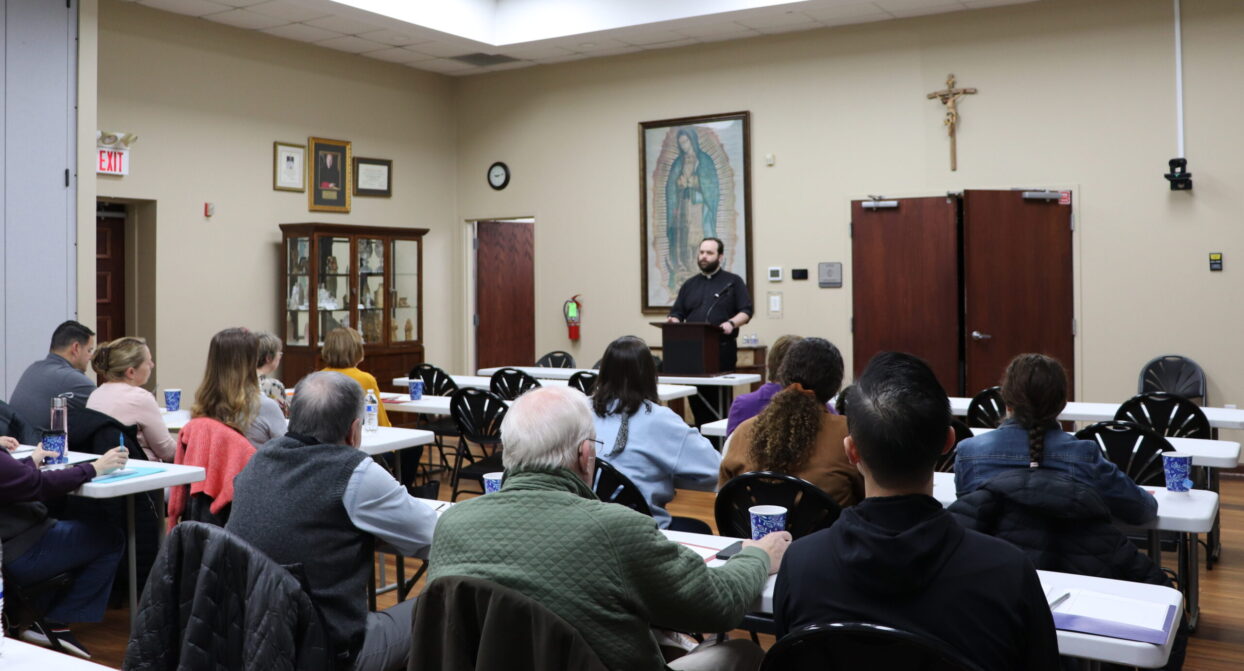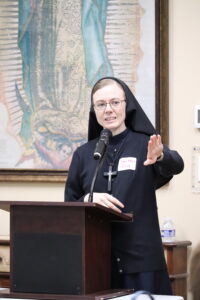Annual retreat caters to Catholic health-care professionals across diocese
By Gabrielle Nolan
Catholic health-care professionals attended a Lenten retreat on Feb. 17 hosted at the Chancery in Knoxville by the local Catholic Medical Association St. Gianna Guild.
The retreat, titled “Walking Lent with the Divine Physician,” included talks, Mass, confession, lunch, adoration, and a special presentation by the pro-life organization Her PLAN.
Father Adam Royal, parochial vicar at St. Thomas the Apostle Parish in Lenoir City, serves as the chaplain for the guild and presented three talks for the retreat.
Christ the Sacrament
In Father Royal’s first talk, “Christ the Sacrament,” he referenced Mark 1:29-31, which is the story of Jesus healing Simon Peter’s mother-in-law from a fever.
“I think this is a very important passage, especially for us as Catholics, because I think a lot of our sacramental theology itself flows from this one passage, and that can often surprise us,” he said.

Sister Mary Lisa Renfer, RSM, medical director for the St. Mary’s Legacy Clinic, standing right, interacts with clinic volunteers, standing from left, Dr. Richard Rose, Dr. John Harris, and Dr. Thang Phan, as they update their phones. (Photo Gabrielle Nolan)
“So, we look at that scene at the base level, it seems like most any miracle that Jesus performs,” Father Royal continued. “He points out to them there’s someone sick and suffering, He goes in, He fixes the problem, and everybody kind of moves on. There’s something else going on in this scene: Jesus does something here that He does not always do. And that is, He reaches out, He grabs her by the hand, and picks her up. That’s a very powerful kind of scene. Jesus doesn’t have to do that. He doesn’t have to be near someone to heal them. He can heal them from anywhere that He wants. We remember that fact at every Mass when we say that prayer, ‘Lord I am not worthy that you should enter under my roof, but only say the word, and my soul shall be healed.’”
Father Royal said that grabbing someone by the hand is a “distinctively human act.”
“It’s something that really kind of touches us at a different level that we don’t always experience,” he said. “It reassures us of the presence of another person, and that’s important in a moment of suffering. If you think about suffering and illness, it’s a very isolating experience. Think back to the last time you were sick. You couldn’t convey to the people around you exactly what was going on within you. No matter how hard you try, you can’t get them in the midst of that suffering, and you really want to, which is something somewhat unique to suffering.”
Father Royal mentioned how easy it is to think only about Jesus’ divinity rather than His humanity.
“He’s beginning the process of healing just by reaching out and touching her. He’s touching her at a human level,” he said. “And yes, His divinity is fully present with Him, but He’s fully human, too. And when He goes to a life and tries to offer healing to them, He reaches them at every level of who they are. And in that moment when she’s lying in bed sick and probably feeling very isolated and alone, unable to offer her experience to those around her, Christ reaches out His hand and begins to take on some of her burden as well. That’s where the healing starts for her, and it doesn’t end there, of course. He picks her up, and this is where the divinity kicks in, and the fever flees; He gives her the healing that she so desperately wants.”
Father Royal said that when Christ steps into a situation combining His humanity and divinity, the best way to look at that is “Christ is a sacrament in those moments.”
“He is the central point for the divine and human realms to intersect and become perfectly united together, and that’s what He is carrying to His every encounter,” he explained. “That’s what He’s offering to Simon’s mother-in-law in this moment, is the sacrament. He’s bringing to her healing not only at a human level, at every aspect of who she is body and soul, but He’s bringing also divine healing into that moment.”
Not only does Christ solve the problem at the surface level, but He goes to the root of the problem, Father Royal noted.
“When Christ is offered to us in the Eucharist or any other sacrament, He’s going to go a lot deeper. He’s going to go down to where the real problems are and try and bring healing in those places. That’s what He brings to us. And I think it’s what we have to begin to see as our own ministries, in a sense, especially as healers. That’s what you want to do. Your job, what you’re paid for, is to fix some kind of surface-level issue, whatever they’re complaining about. But as Christians, as those who follow Christ, your real role is to bring healing at every level in the same way that He did. So, we have to remember that when we go to encounter people, no matter what they’re saying, there’s a whole lot more going on. That when they’re lying there, they are suffering, they are alone, they are isolated. They want to share that with you, they want you to help them carry that burden in that moment in addition to everything else that you have to do for them.”
Christ the Suffering
In his second talk, “Christ the Suffering,” Father Royal looked at a universal question: why do people suffer at all?
“God could readily create a universe in which we don’t experience such things, and yet here we are,” he said. “And to understand why we suffer, why we go through the things that we have to do, why you all have to be medical professionals, why the world needs you, we have to look back at the Garden of Eden.”

Health-care professionals take part in the Catholic Medical Association St. Gianna Guild’s Lenten retreat on Feb. 17 at the Diocese of Knoxville Chancery. (Photo Gabrielle Nolan)
Father Royal noted that God created a perfect universe where everything seemed to work together, but “even having that kind of perfect universe, it seemed like [Adam and Eve] weren’t totally satisfied with it, and an option was presented to them to turn away from God, and they took it. And when they take that option, death then enters into the world. When death is in the world, everything begins to seem to just fall apart.”
“Death and suffering that we experience in this world is our fault,” Father Royal continued. “Not that we were there and we made the same choice, but we would have; we demonstrate that every day in our own failings and choices. We know we would have done it. And so in some sense we are responsible for all that we see around us, but sometimes we think, well, God, it feels like you went a little far with it, right. Did we really deserve this much suffering for that choice then? And to find even the beginnings of an answer to that, we have to turn to the Scriptures again. And one of the great figures in Scripture, just kind of asked God this question, Job.”
Father Royal briefly recounted the Book of Job, where the protagonist undergoes great suffering, such as losing his livestock and children and enduring physical ailments.
“Job goes through a lot. That man has a terrible life throughout the middle portion of that book,” he said. “And then finally towards the end he gets the opportunity to directly encounter God … when he gets his chance to talk to God, he just says to Him, ‘Why are you doing this? I don’t think that I personally deserve everything that’s happened here.’”
“And God’s answer to him is really unsatisfying,” Father Royal continued. “He just looks at him and says, ‘Can you tell me how the rain works? Can you tell me how these other things work? Do you understand anything about the universe that you live in Job?’ Job says no. ‘So, then you’re not going to understand my answer to this question either. You don’t understand anything about the world around you. How can you understand something this complicated? Something much more fundamental than the world.’ And there’s a certain truth to that, that can get us through a day sometimes, to just think, well, I’m not going to get it anyway. But it’s not the end. We know there is a reason for it; we know something about this has to make sense, and so we keep asking. We ultimately find that the best answer that we’re going to get is Christ Himself. And the Church gives us this answer every single year at the great feast of the resurrection, in the Easter Vigil.”
Father Royal pointed to the “Exsultet,” the proclamation of Easter.
“When it looks back at our fall in Eden and it says, ‘O happy fault that merited for us so great a Redeemer,’ ultimately that is the answer to human suffering,” he said. “That when God created the universe, He could have created us such that we would not sin and that we would have lived in paradise forever, just freely enjoying it. But He permits sin in the world; He lets us fall, and He lets us fall foreseeing that He could show us His love in the fullest possible way, in Christ Himself. That’s ultimately why He allows this. He doesn’t want us to sin, don’t get me wrong. He’s not encouraging us to in order to save us. But He permits it for seeing that the good we’ll get back out of it is by far greater than the evil, the suffering that we undergo in the process. That ultimately needing the Redeemer, allowing God to become incarnate in the world, to suffer for us, to die for us, demonstrates God’s love to us in a way that nothing else could. And there is nothing else greater for us in this life than to know how much God loves us. And so He shows us that in the flesh.”
Father Royal noted that when it comes to suffering, people often say “we want the healing, and we want God to just snap his fingers, end this, let me move back on with life.”
“But if the life we return to after that is the same one that we were experiencing before the suffering, then there was no point to it,” he said. “If we’re truly honest with people, they need something much deeper than just fixing the problem. Even Christ in His own life has some of that experience. Look at His prayer in the Garden of Gethsemane, when He says to His father, ‘If you will, if you can, take this suffering away from me.’ He experiences that same desire that we have. ‘Take this part away from me, and let’s find another option.’ But He ends His prayer with, ‘But not as I will, as you will.’ Recognizing that while yes, He doesn’t want to suffer, no one really does, but there can be a good in it. A good that by far outweighs whatever we’re experiencing in the moment. And so He submits Himself to the Father’s will in that moment. Many people are in that situation, they’re going to say I just want my problem fixed; I want my life back; I want everything to return, but that’s not really what they need in that moment. They need the same thing everyone needs: they need the healing that only Christ Himself can offer. They need to re-evaluate their lives, to really look at the trajectory that they’re on and find healing at every level of who they are.”
Christ the Healer
Father Royal’s third and final talk, “Christ the Healer,” was presented in the Chancery chapel during eucharistic adoration.
“Fundamentally, we do believe that when God takes on human flesh, He changes reality in some way,” he said. “He takes on the whole of the human condition and relates all of us to Himself. In the same sense that all of us bear something of the fault of Adam when he sinned, so also in Christ do we participate in His life in some way. Just as we’re all descended from Adam, when God comes into the world, we’re all now descendants of Him in a certain way.”
Father Royal presented the question: What is it that Christ wanted to change about our world?
“Why would He bother making everything different for us? It goes back to that idea of the Garden of Eden,” he explained. “He recognizes all that we lost, all that we suffer because of that choice that we made, and He wants to give it back to us. That’s why He does the things that He does in His ministry. You see Him going out liberating people from evil spirits, healing them, feeding them, taking care of them. He’s doing everything that He can to free them from the consequences that we inherited from original sin and give us back paradise. He wants His people to be free to experience the new creation, that new world.”
Father Royal stressed the idea that when someone shows love to another individual, it is God loving through them.
“They’re experiencing not just your love, they’re experiencing His love. They may not be fully aware of it, but they are. You touch them, they experience God touching them in the same way that Simon’s mother-in-law did. Christ has truly changed our natures, and it’s up to us to realize it, to constantly live it out and make it more present,” he said.
“And so every one of us, when we’re going out and seeing people, and we’re seeing suffering, we should remember we’re looking at the consequences of our choices,” Father Royal continued. “But even so, Christ is calling us to be present there, to bring the healing to that person. Not just the healing of their body, as we said they’ll say they want, but the full healing, to help them realize that there is a better option. That sin and death and suffering, those things do not have to win in your life because Christ has conquered them if they’ll hand their lives over to Him. We can help by loving them and acting according to those graces. We can help bring them to that realization. Maybe not immediately and consciously in that exact moment; those actions make a difference. No one who experiences the love of God walks away unchanged. They always remember it.”
The chaplain said that it is a great honor for people to be members of Christ’s body and to carry Christ to every single person.
“I think we need to hold that with us, to remember that in every single encounter that eternity is in fact at stake. Not just ours, theirs. That we can offer them a healing much greater than anything they would ever dare to ask us for, if we simply respond to Christ in that moment,” he shared.
‘Come together to pray’
Katie Watson, a parishioner at Holy Ghost in Knoxville, is currently a nursing student at Pellissippi State Community College.
“By coming here today I learned about the St. Mary’s (Legacy) Clinic, and so I’m really interested in volunteering with them,” she said. “The priest that led the retreat, his wisdom was amazing and just the people that showed up and the questions and the conversation, it’s really been eye-opening to me. I look forward to working more with these people and learning more about it. It’s good for health care to just have God present in it and those connections you make with patients.”
Ms. Watson said her faith is what inspired her to pursue a nursing degree.
“The human connection of it, how important it is—more than just the medical healing of it, but the spiritual connection between souls and just like being present with them, the empathy, the compassion,” she explained.
Lisa Padgett, a parishioner at All Saints in Knoxville, is a pediatrician.
“I’m a member of the Catholic Medical Association, and I felt this was a wonderful experience,” she said. “I appreciated the opportunity to attend Mass, attend confession, and attend eucharistic adoration. They had wonderful speakers that gave a Catholic take on this and a Catholic focus. I highly recommend it. It was a nice group of people from different aspects of health care and a nice networking opportunity, as well as Sister Mary Lisa and company did a fantastic job with organization. I’ll look forward to attending things in the future.”
Sister Mary Lisa Renfer, a Religious Sister of Mercy of Alma, Mich., serves as the president of the St. Gianna Guild.
“I think Father’s talks were very well-received and very helpful for everyone here. I especially liked how he really pointed out Christ’s healing ministry and how he helped us understand suffering in a whole new way. I think it opened up some great discussion among us,” she shared.
“I think it’s so important to come together to pray together and to be able to speak freely about different struggles and issues and the joys and sorrows of being a Catholic physician and health-care worker,” Sister Mary Lisa continued. “And I think coming together helps build one another up; it helps to support each of us in our ministry and helps us to keep moving forward and to remember that we’re not alone, and that Christ is the one who ultimately strengthens us to help those in need.”
The St. Gianna Guild will host its next event on May 18, when Religious Sister of Mercy Mara Lester, who is a physician, will speak about addressing transgender ideology as a Catholic medical provider.
To join the Catholic Medical Association and learn about upcoming events, contact Sister Mary Lisa at srmarylisa@almamercy.org.


